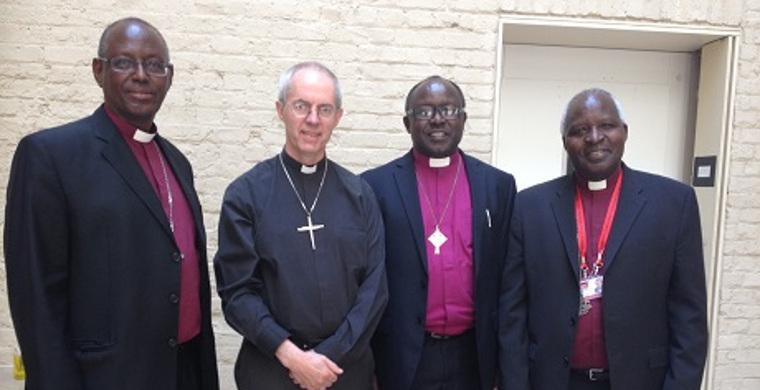Apb Welby: "Next Lambeth Conference a decision for the primates"
By Jan Butter
ACNA News Service
October 6, 2014
Archbishop Justin with (from left), the Most Revd Bernard Ntahoturi; the Most Revd Henri Isingoma; and the Most Revd Onesphore Rwaje.
Archbishop of Canterbury Justin Welby has responded to inaccurate media reports that the Lambeth Conference had been cancelled by saying, "As it hasn't been called, it can't have been cancelled".
Speaking to the BBC's William Crawley, the spiritual head of the Anglican Communion said the historic meeting of bishops from around the world would take place sometime after the primates* had met together.
"When I was installed in Canterbury as archbishop I met all the primates, they all came to that, and I said to them that I would visit all of them in their own country which, God willing, I will have done by the end of this November, and that at the end of that we would consult together about when to have a Lambeth Conference."
We will decide together
Archbishop Welby, who is also primate of the Church of England, stressed that, "The next Lambeth Conference needs to be called collegially by the primates, together with real ownership of the agenda and a real sense of what we're trying to do with such a large effort, such cost. So when we meet as primates, which I hope we will do...with reasonable notice after the end of [the visits to all the primates], then we will decide together on the details."
Archbishop Welby said that by the time those details have been finalised it will likely be too close to 2018 to organise such a large event for that year. Therefore having the conference in that year was doubtful.
"It would be enormously difficult simply to book a place big enough...One of the places they've gone for the last few conferences is already booked up for 2018, so three years is far too little time to arrange such a huge operation."
No Anglican Pope
When pressed for a conference date by the BBC interviewer, Archbishop Welby was adamant that that would be a decision for the primates.
"We just need to be very, very clear about this. There is no Anglican Pope. Decisions are made collectively and collegially and I am absolutely committed to not pre-empting what the primates choose to do."
Anglican Communion alive, vigorous
The Archbishop went on to say that it would be up to individual bishops to make up their minds at the time of the Lambeth Conference about whether they would attend.
"I'm not keen on pre-empting their decisions...But what is absolutely clear is that the Anglican Communion is alive and incredibly vigorous. It is noisy, argumentative, diverse, has churches in 165 countries, in 38 provinces. It would be bizarre if there weren't tensions in something that is so incredibly diverse."
Over the past two years, the Archbishop and his wife Caroline have travelled extensively making personal visits to the senior bishops of those Churches that comprise the Anglican Communion.
"All the indications are that they want the Communion to flourish," he said, "that they want to have meetings to discuss the issues that face us: How do we live as a Communion in a way that demonstrates very important differences over issues of sexuality? Over issues of how we deal with power, money, with cultural customs in all parts of the world, or parts of the culture in which we live?"
Questioning God is OK
When asked by the BBC reporter for his response to recent media reports he was agnostic, the Archbishop laughed out loud. "I am a believing Christian," he said. "I believe in God, I believe that Jesus Christ is God. I say the Creed without crossing my fingers at any point. Clear."
The reports arose after Justin Welby's tour of England's West Country when he was interviewed ahead of Holy Eucharist at Bristol Cathedral.
"I was asked a question: 'Did I ever have any doubts?' I said, 'Yes, everybody has doubts'. It's true. I think everybody has moments of doubt. They then said, 'What do you do with those moments of doubt?' I said, 'I pray, and I find that God is extraordinarily faithful even when we're faithless, he overcomes our weaknesses.'"
The Archbishop told the BBC's William Crawley that reports of his interview at the cathedral had omitted the second half of the answer.
"You find in the Psalms these extraordinary Psalms of questioning. In Job you find Job saying, 'I wish I could believe God didn't exist; what I'm really worried about is that he's against me'.
"I've lived through extraordinary things in my life," explained the Archbishop, "The death of a child, all kinds of really testing things, being in war zones, and there have been many moments where I've said, 'God what are you doing? Why is it like this?'
"So here's an extraordinary idea: that the Archbishop of Canterbury doesn't believe in God! I believe in God. I, just like everyone else, ask lots of questions and I ask God the questions and I find that he is faithful."
Notes
*Primates are the most senior bishops from each Member Church/Province
Jan Butter, Director for Communications at the Anglican Communion Office














